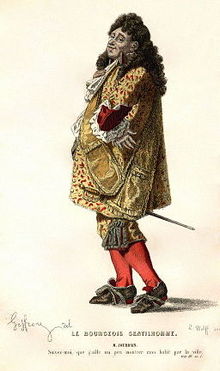Bourgeois Gentilhomme
| Le Bourgeois gentilhomme | |
|---|---|

Le Bourgeois gentilhomme
|
|
| Written by | Molière |
| Music by | Jean-Baptiste Lully |
| Choreography | Pierre Beauchamp |
| Characters | Monsieur Jourdain Madame Jourdain Lucile Nicole Cléonte Covielle Count Dorante Marchioness Dorimène |
| Date premiered | October 14, 1670 |
| Place premiered |
Château de Chambord Versailles, France |
| Original language | French Sabir |
| Subject | social climbing satire |
| Genre | comédie-ballet |
| Setting | Paris |
Le Bourgeois gentilhomme (French pronunciation: [lə buʁʒwa ʒɑ̃tijɔm], The Bourgeois Gentleman or The Middle-Class Aristocrat or The Would-Be Noble) is a five-act comédie-ballet—a play intermingled with music, dance and singing—written by Molière, first presented on 14 October 1670 before the court of Louis XIV at the Château of Chambord by Molière's troupe of actors. Subsequent public performances were given at the theatre of the Palais-Royal beginning on 23 November 1670. The music was composed by Jean-Baptiste Lully, the choreography was by Pierre Beauchamp, the sets were by Carlo Vigarani and the costumes were done by the chevalier d’Arvieux.
Le Bourgeois gentilhomme satirizes attempts at social climbing and the bourgeois personality, poking fun both at the vulgar, pretentious middle-class and the vain, snobbish . The title is meant as an oxymoron: in Molière's France, a "gentleman" was by definition nobly born, and thus there could be no such thing as a bourgeois gentleman. The play is in prose (except for the ballet openings which are in verse).
The play takes place at Mr. Jourdain's house in Paris. Jourdain is a middle-aged "bourgeois" whose father grew rich as a cloth merchant. The foolish Jourdain now has one aim in life, which is to rise above this middle-class background and be accepted as an . To this end, he orders splendid new clothes and is very happy when the tailor's boy mockingly addresses him as "my Lord". He applies himself to learning the gentlemanly arts of fencing, dancing, music and philosophy, despite his age; in doing so he continually manages to make a fool of himself, to the disgust of his hired teachers. His philosophy lesson becomes a basic lesson on language in which he is surprised and delighted to learn that he has been speaking prose all his life without knowing it.
...
Wikipedia
